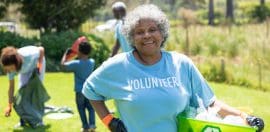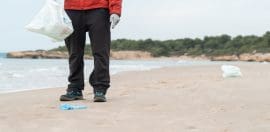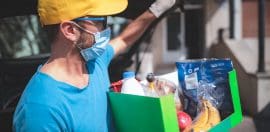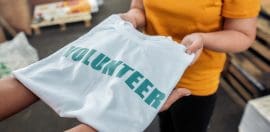Schooling and surfing: Volunteering as a family overseas

Mele (left) and Mark, with their children (left-right) Reine, Ezra, and Sia, in Tonga.
20 April 2020 at 8:17 am
In 2014 Mele took on a volunteer assignment in Tonga, shifting her young family of five overseas. It was an experience that brought them all closer together.
Volunteering overseas means taking on a range of new experiences, challenges, ways of working and ways of thinking. At times enlightening, at others confronting, and almost always enriching, it can be a lot for one person to take in.
So what if that experience was multiplied by five?
Mele volunteered in Tonga for two years supporting the Ministry of Health to manage public health issues, including non-communicable diseases. She worked closely with her counterpart Fusi Kalo, nurse practitioner and manager of community health, to help the ministry identify an essential health package for community health – something Mele was pleased to see implemented as a result of her assignment.
But she didn’t go alone. Alongside her were her husband Mark and children Reine (then three years old), Ezra (four years old) and Sia (five years old).
Mele says there were huge benefits to having her family with her in Tonga.
“They helped open up a community that we would otherwise not be part of, broadening our network of friends and resources,” she explains.
The family home became a hive of activity. Mele and Mark hosted cooking classes where fellow volunteers shared meals from their own cultures. Sundays were reserved for big lunch get-togethers where friends brought homemade food to bake in the umu (underground oven).
Tonga is made up of 169 islands, 36 of which are inhabited by the population of 104,000. Mele and her family lived in the capital, Nuku’alofa, on the country’s largest island, Tongatapu.
Living in a central location met the family’s priorities. Mele was close enough to work to cycle there and back, it was a short walk to town and a short drive to school. Most importantly for Mark, it was close to Ha’atafu surf beach.
Tonga boasts magnificent natural beauty rarely matched elsewhere in the world, with a variety of landscapes from rugged volcanic slopes, to low-lying coral islands, and pristine sandy beaches.
“My daily routine started with an early surf, school drop off, surf again, school pick-up, and then sometimes another late surf with Mele, the kids, and friends,” Mark says.
But it wasn’t all surfing-based leisure. While Mele was at work, Mark became the “main house person”, cooking dinner, and doing the shopping and household duties. If he wasn’t taking the kids to the beach, he was taking them to the library, the community arts centre, and to taekwondo and swimming lessons. Every Saturday the family would load up on fresh fish, fruit and vegetables at the local markets.
The active lifestyle was something the children – Reine, Ezra and Sia – loved most about living in Tonga.
“Going to the beach early in the morning and big family dinners were the best things about living in Tonga,” Sia says.
Tongan food was also a hit. Roasted pig was one of the kids’ highlights, as were pancakes made by their next door neighbour, and the steamed buns that a fellow volunteer taught Mark how to cook. At Christmas time a “lolly truck” would drive through the streets of Nuku’alofa with its passengers throwing lollies out to children running behind.
Mele and Mark chose to enrol the kids at an international school. If she had her time again, Mele would have chosen a local school for the kids.
“What I know now is that my children would thrive regardless of whether they went to an international or local school,” she says.
Going to a local school could have helped Mele, Mark and the kids build relationships with local children and families.
“Relationships with local children outside of school and in our neighbourhood were difficult to cultivate, because we were friends with mostly English-speaking and westernised Tongans,” Mele says.
“The language barrier was challenging, and ‘playdates’ were difficult to set up as Tongan women were often shy, and self-conscious to interact with me.
“This unique experience would have connected them a lot more to local children and the Tongan language.”
Throughout their time in Tonga the family spent a lot of time together, which on reflection, Mele, Mark and the kids agree was the best part of life in Tonga.
“Our pace of life slowed down to suit Tongan time, and we came to know that home really can be anywhere,” Mele says.
“You get to spend lots of quality time because you’re in a smaller space. You spend less time commuting, and you don’t have the same responsibilities you would in Australia, so you can put that time into your family.”
With less distractions, they spent more time cooking, baking, kayaking, taking beachside picnics and making arts and crafts. It was the perfect environment for bonding and learning.
“As our children were all under five when we arrived, they experienced some significant developmental milestones, including becoming more social and fascinated by the world around them – Tonga was an excellent source for all their ‘who’, ‘what’, ‘where’ and ‘why’ questions,” Mele says.
It takes a lot to balance the expectations of a volunteer assignment while supporting a young family in a new environment. Mele approached the challenge in the same way she balances work and life in Australia: following routines and having structure, but also being adaptable when change was needed.
“I am always surprised how much my children can recall their memories of Tonga, and the specific details they give,” Mele says.
“I like to think Tonga gave them a sense of self and personal identity, which is why their memories are so real to them.”
For the kids, there is one memory that stands out above all else.
“I miss my family and friends,” Sia says.
“But what I miss most is spending lots of time with Mum and Dad.”
To learn more about the Australian Volunteers Program visit australianvolunteers.com.







